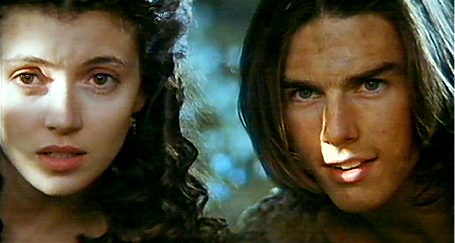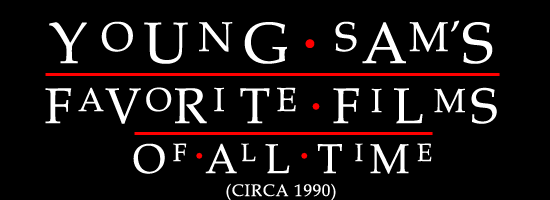No. 4: LEGEND

Reviewed by Sam Hatch
AS THIS IS PART OF A RETRO NOSTALGIA BINGE AS OPPOSED TO A TRADITIONAL REVIEW, THERE MAY BE SPOILERS PRESENT IN THE TEXT.
Yes, another cult film. Ridley Scott was high on my list of cool directors at the time, what with Blade Runner and Alien already under his belt at this point in time. (I hadn't seen The Duellists then, but I highly recommend it now). 1986 was the summer of Tom Cruise way before his couch-bouncing e-meter reading days of recent lore. But the film most people remember him from that summer was Top Gun. Legend hit theater screens before that F14 Tomcat-flying (or was it TomKat?) lump of celluloid masculinity and was promptly panned and forgotten. But not by yours truly. The version I fell in love with was the American Theatrical Cut, in which the story was actually the most impacted by gratuitous trimming.
On the plus side, it was accompanied by a haunting score by Tangerine Dream, which replaced the original work by Jerry Goldsmith found on the longer, European Cut. I'm in the minority in my opinion that the TD score actually works better at establishing the mood of the feature, but I am glad to finally own the alternate version. But man, I used to listen to that Tangerine Dream album all the frickin' time in the late eighties. Bryan Ferry's Is Your Love Strong Enough was also a favorite, and I remember almost tripping over my coffee table in a fevered, clumsy effort to slap a blank tape in the VCR so I could record the music video when it randomly appeared on MTV one afternoon. The video's actually on the newest DVD release, so check it out and keep an eye open for David Gilmour's appearance during his guitar solo.
Legend was Scott's attempt at crafting something fantastical that his children would enjoy. Reading the original script by William Hjortsberg, it's easy to see that the finished product has become quite different than its Lord of the Rings-cum-Beauty and the Beast origins. Still, and this may be partly due to my hormone-ridden status of a fourteen-year old, I loved the frickin' thing. And for all of its twee moments of princesses skipping through flower-laden fields, there's an inherent element of darkness in the film.
Literally in the figure of Tim Curry's demonic antagonist, who is indeed only referenced as 'Darkness' within the script. Though he answers to higher unseen deities, he looks very much the part of the traditional devil figure, with cloven-hoofed feet and blood red skin. The makeup work is superb, and the design trumps every previous cinematic satanic embodiment with Darkness' massive, spiraling goat horns. I'm sure they were much lighter than they appear, but I'm surprised Curry could hold his head up during filming. The filmmakers made up for the discomfort of giant horns and the necessary contact lenses with ego stroking super-ripped chest prostheses. Dr. Frankenfurter never looked this cut.
The story involves the unlikely courting (on the verge of Romeo & Juliet territory, though that end is never fully explored) of Tom Cruise's wood spirit Jack O' The Green and Mia Sara's privileged Princess Lily. Lily has a fascination for the common life, and indeed we never catch a glimpse of her castle home as she's always gallivanting in the woods and hanging out with the local peasant Nell. Jack teaches her his Doolittle-esque skill with woodland animals, and Lily continues to withhold her love teasingly, in exchange for further gifts and knowledge from him. This culminates in the eventual 'thinking with the wrong head' moment in which Jack naively shows her the frolicking ground of two Unicorns, which mortals are forbidden to touch. In the Goldsmith scored version, Lily uses her gift of song (which she also uses to woo animals and Jack himself) to attract a Unicorn close enough to touch.
While this unravels, Darkness' three goblin henchmen who have been tailing her (knowing that innocence is the perfect lure for such a creature) shoot poison darts at the creature and haul off on horseback to chase it down. Their goal is to cut off its magical horn (know as the Alicorn), which will plummet the world into icy darkness and lend Darkness an unstoppable power. The mechanics of this scheme don't always make a hell of a lot of sense (how did they know Jack would bring her to the Unicorns?), but when you're wrapped up in the majestic, emotional flow of the picture, it doesn't ultimately matter.
Even while the skies turn black with roiling clouds, Lily still seems selfishly oblivious to the heresy of her deed, and is more keen on tossing her jewelry into a nearby lake while exclaiming that the man who finds it will win her hand in marriage. Of course 'Sir-P.-Whipped' Jack abandons thoughts of saving the world long enough to dive in, but once the ice front sets in the two lovers are torn asunder. Lily seeks refuge in Nell's frosted cabin and finally feels sorry (mostly for herself) once the Goblin hordes stop by for a little fun and games.
On the other side of the forest, Jack encounters a group of fellow woodland entities. Billy Barty and Cork Hubbert play humorous hobbit-like creatures Screwball and Brown Tom, and The Tin Drum's elfin star David Bennent plays their leader Honeythorn Gump. Despite his childlike appearance, Gump is actually quite dangerous and is furious at Jack for destroying the world in favor of his hard-on. This is one of the most notoriously trimmed scenes, as originally Gump uses a charmed violin to make Jack dance against his volition. This quickly turns sour as he forces Jack to thrash about wildly, and later mentions that he can actually dance him to death if he so desires. Some of this footage makes it into the recently released director's cut DVD (as it did in the old TV version of the film), but still isn't as complete as it was in the script. Watch as Jack's dry hair in one scene suddenly turns matted and sopping wet in the next!
Eventually, Jack's devotion to pure love weakens their resolve, and upon his solving of a particularly difficult riddle, the group decides to help the lad save the world and rescue his lady fair. The latter plan doesn't please Oona, a faerie sprite within the group who appears as a floating orb to everyone but Jack, who she has become smitten with. He avoids her advances long enough to raid an old treasure trove for supercool armor and ready the advance on Darkness' hideout within a huge, gnarled tree. One of the best moments in the film involve Joe Dante regular Robert Picardo's performance as the sickly green hag Meg Mucklebones and his/her encounter with Jack in a swamp. This is another scene that has existed in numerous differing lengths, and the director's cut finally puts it all together again.
Lily has an edgier character-based journey, in which she is consistently tempted by Darkness' gifts, which include food, jewelry and a gothic black gown that actually dances on its own before fusing with her when she succumbs to desire. That sequence is great, and works much better with the Tangerine Dream music. It adds an element of danger to the proceedings, whereas Goldsmith plays it like a traditional musical dance number. Once she yields to the dress, she physically changes into a heavily made up goth Siouxsie Sioux/Human League look-alike, and meets Darkness in the flesh in one of the best villain entrances of all time.
While most of the action occurs during the Jack scenes, the Jean Cocteau-esque dining scenes with Darkness and Lily create the biggest sparks. While the film does satisfy on a simple, fairy tale level, it becomes much more satisfying when you look for the flaws in the main characters and find the evil that comes so easily to Princess Lily. The original story took things to a more extreme conclusion, with Lily transforming into a furry monster and being sexually taken by Darkness in a bestial display. Scott toned it down, but the elements of that concept are still retained. Questions arise as to how 'innocent' Lily really is, and whether or not she will simply break Jack's heart at the end.
There have been many assessments of the variations in Legend's releases, the best being an article in Tim Lucas' Video Watchdog magazine. While constantly waiting for a promised Laserdisc boxed set that never materialized, I made do with VHS copies taped off of cable. I also purchased the pan and scan laserdisc of the American release, multiple copies of the Euro cut (including the coveted Japanese laserdisc), a PAL tape from England that I can't even play, and the Japanese widescreen DVD of the Euro cut. Luckily, the newest DVD Ultimate Edition renders all of that stuff obsolete with a longer version of the European cut complete with Goldsmith score, backed with a widescreen presentation of the American Tangerine Dream version, a great making-of documentary and an important workprint scene that was supposed to occur at the start of the film. I've loved Legend for twenty years now, so I suppose I've proven that my love is strong enough. Take it, Mr. Gilmour…
